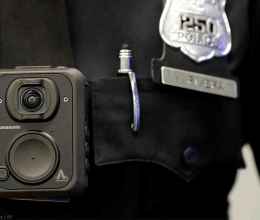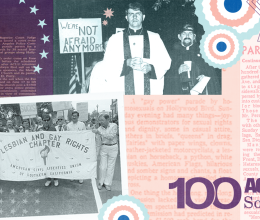LOS ANGELES—The City of Barstow has reached a settlement agreement with the ACLU Foundation of Southern California (ACLU SoCal) on behalf of two brothers who were arrested for refusing to identify themselves to police officers.
The agreement calls for training Barstow officers to recognize that a refusal to identify is rarely sufficient reason to make an arrest. Shortly before the settlement was reached this week, video surfaced of a Barstow Police Officer wrestling a pregnant woman to the ground for refusing to show her identification.
The incident leading to the settlement involved brothers Jesse and Robert Katz. In January, 2014, they were eating at a taco shop when another customer accused them and others in the restaurant of stealing from him.
The man called the police, but he had no evidence and admitted that he had none when the police arrived. Nonetheless, the officers asked the Katz brothers for their identifications. When the Katz brothers refused, the officers arrested them and took them to jail for obstructing a police officer.
The ACLU SoCal investigated, and took their case.
“We prepared a lawsuit against the Barstow Police Department and reached a settlement,” said ACLU SoCal staff attorney Jessica Price. “Barstow agreed that officers may not arrest someone solely for refusing to show identification. They agreed to train officers on this new policy. The Katz brothers will be compensated, but they had fought for nearly a year to get their cases dismissed and clear their names.”
In a second incident, Charlena Michelle Cooks, who was eight months pregnant, was handcuffed behind her back and arrested for refusing to show her identification to a Barstow police officer. The arrest occurred just after she had dropped off her daughter, a second-grader, at school.
ACLU SoCal staff attorney Adrienna Wong said it is important to understand that if you exercise your right to refuse to show your ID, an officer might arrest you. “It would be a wrongful arrest, but it would be an arrest,” she said.
Cooks was charged with resisting arrest, but a judge later dismissed those charges. “Even if an officer is conducting an investigation, in California, unlike some other states, he can’t just require a person to provide ID for no reason,” Wong said.
The officer can ask, Wong said, but the person can say no. “Officers in California should not be using the obstruction law, Penal Code 148, to arrest someone for failing to provide ID, when they can’t find any other reason to arrest them,” she said.
Cooks’ arrest was captured on the officer’s body camera, and the video shows an interaction between law enforcement and individuals of different races.
Price asked whether race played a role in the difference in treatment.
“Imagine getting wrestled to the ground and handcuffed in front of your child’s elementary school,” Price said. “Imagine interacting with other parents afterwards. Imagine what kids who saw the incident tell your child. And if you think the whole incident happened because of your race, how does that impact your view of police?”
Price said the public should not have to speculate about the role of race in law enforcement. “We should know,” she said.
Two bills pending in the legislature, AB 953 and AB 619, would require officers to record data about their stops and uses of force, including the race of the individuals involved, and report that data to the attorney general.
“We give police a great deal of authority to stop people, to detain them, to search them, even to shoot them,” Price said. “Requiring police to report how they use those powers, in an effort to measure racial disparities and help identify solutions, is a small price to pay for fairer policing.”
Read the settlement
View the video
Learn more about the case
Contact: Sandra Hernandez, 213-977-5247, shernandez@aclusocal.org
Ed Boyer, 213-977-5242, eboyer@aclusocal.org
BREAKING
Court Prohibits DHS from Racial Profiling, Denying Counsel






